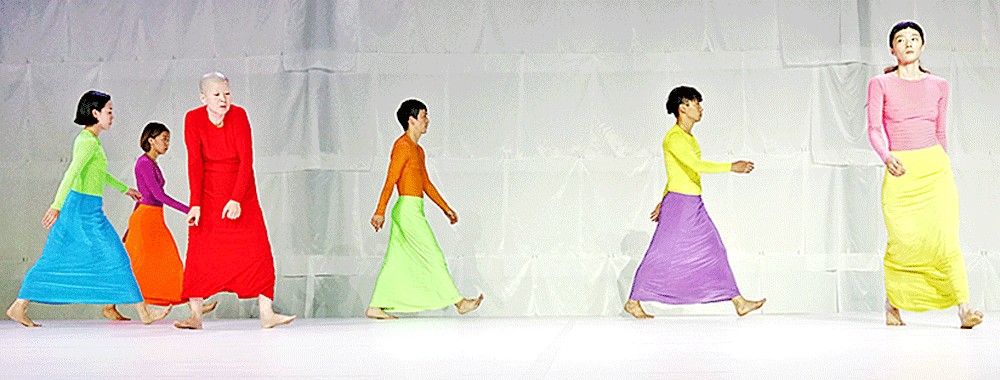Popular Reads
Top Results
Can't find what you're looking for?
View all search resultsPopular Reads
Top Results
Can't find what you're looking for?
View all search resultsDance festival calls for celebration of human body, freedom
The 14th installment of the Indonesian Dance Festival (IDF) is coming with a theme that is loosely based on personal freedoms and democracy of the body.
Change text size
Gift Premium Articles
to Anyone
 Colorful beats: A choreographed piece entitled “Let Me Change Your Name” by South Korean choreographer Eun-Me Ahn graces the 2018 Indonesian Dance Festival (IDF) at the Taman Ismail Marzuki on Nov. 6. In this work, Ahn questions the identity and social class of modern men and women. (Courtesy of IndonesianDanceFestival.id/-)
Colorful beats: A choreographed piece entitled “Let Me Change Your Name” by South Korean choreographer Eun-Me Ahn graces the 2018 Indonesian Dance Festival (IDF) at the Taman Ismail Marzuki on Nov. 6. In this work, Ahn questions the identity and social class of modern men and women. (Courtesy of IndonesianDanceFestival.id/-)
T
he 14th installment of the Indonesian Dance Festival (IDF) is coming with a theme that is loosely based on personal freedoms and democracy of the body.
The theme of the event, which is taking place at various venues in Jakarta from Tuesday to Saturday, is Demo/Cratic Body: How Soon Is Now? It involves dancers not only from Indonesia but also other countries such as Mexico, France, India, Germany, Australia, Singapore and South Korea.
The context and the vision of the festival this year are based on Indonesia’s cultural experience as demonstrated by works in progress, usually by innovative young artists. Through it, the festival feels it is uncovering the untapped potential of hidden and relatively unknown Indonesian dancers.
Festival co-initiator Maria Darmaningsih, a performing arts professor at the Jakarta Art Institute (IKJ), elaborated on the topic of the dance festival, saying that it was a form of expression and gratitude for the amount of freedom that was able to be expressed today in dance.
She said freedom was essential for giving true, honest performances without succumbing to uniformity, such as in the New Order days when IDF dancers were usually required to perform in uniforms.
“Freedom is a powerful form of expression,” Maria said. “Through this theme, we are challenging the participating dancers with the idea: Within this political climate, what do they want to show through dance?”
While acknowledging that many important figures in the Indonesian dance community reportedly tend to dismiss the notion of modern dance, Maria added that the concept employed by the IDF is one that was open minded enough to allow unorthodox ideas to flourish within the dancers.
To encourage the idea of inclusivity, both professional and amateur dancers and dancers from several universities are to take part in the festival.
According to IKJ rector Seno Gumira Ajidarma, the IDF must serve as a good example of artistic consistency for all artists of all media in Indonesia.
“By doing so, the IDF can act as its own standard of quality as the dances featured in this festival are consistently shown to only increase in quality as the festival days go on,” said Seno, who is also a writer.
Throughout the years, the IDF has showcased more than 250 works by Indonesian choreographers, as well as from Asia, Europe, Australia, Africa and the Americas. The festival has been running since 1992.
This year, the program is also being curated with the help of international guest curators from Japan, Singapore and Germany. Its programs include the main showcases, workshops from the IDF dance academy, presentations, seminars, master classes, commissioned works and competitions.
The venues hosting this year’s event include Taman Ismail Marzuki, the Jakarta Playhouse (GKJ), the National Library of Indonesia and the Salihara Community. Taman Suropati in Menteng, Central Jakarta, is holding a post-event on Nov. 18.
Aligning with the theme of democracy and freedom, the participating international troupes will also bring their own versions and interpretations to the stage. What most of them have in common is a focus on relative unity through the expression of one’s body.
South Korean guest dancer and choreographer Ahn Eun-me explained that her seven-person troupe’s routine will serve to embody the essential instincts of democracy through their energetic performances.
The mix of male and female dancers, she said, was one way of showing that “the body is democratic, as men and women are essentially the same”.
“The repertoires in this event show how Asian culture can be understood through bodies,” Ahn said.










